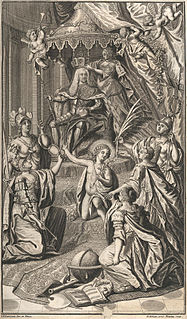Related Research Articles

The prince-electors, or electors for short, were the members of the electoral college that elected the emperor of the Holy Roman Empire.

Louis IV, called the Bavarian, of the house of Wittelsbach, was King of the Romans from 1314, King of Italy from 1327, and Holy Roman Emperor from 1328.

Leopold I was Holy Roman Emperor, King of Hungary, Croatia, and Bohemia. The second son of Ferdinand III, Holy Roman Emperor, by his first wife, Maria Anna of Spain, Leopold became heir apparent in 1654 by the death of his elder brother Ferdinand IV. Elected in 1658, Leopold ruled the Holy Roman Empire until his death in 1705, becoming the longest-ruling Habsburg emperor. He was both a composer and considerable patron of music.

Wilhelm Egon von Fürstenberg-Heiligenberg was a German count and later prince of Fürstenberg-Heiligenberg in the Holy Roman Empire. He was a clergyman who became bishop of Strasbourg, and was heavily involved in European politics after the Thirty Years' War. He worked for the Archbishop-Elector of Cologne and Louis XIV of France at the same time, and was arrested and tried for treason for convincing the Elector to fight on the opposite side of a war from the Empire.

Rudolph Johann Joseph Rainier, Archduke of Austria, Prince Royal of Hungary and Bohemia, Cardinal-Archbishop of Olomouc, was a member of the House of Habsburg-Lorraine, and an Austrian clergyman and noble. He was consecrated as Archbishop of Olomouc (Olmütz) in 1819 and became cardinal in the same year. Rudolph is known for his patronage of the arts, most notably as sponsor of Ludwig van Beethoven, who dedicated several of his works to him.
The imperial election of 1486 was an imperial election held to select the emperor of the Holy Roman Empire. It took place in Frankfurt on February 16.
The imperial election of 1531 was an imperial election held to select the emperor of the Holy Roman Empire. It took place in Cologne on January 5.
The imperial election of 1562 was an imperial election held to select the emperor of the Holy Roman Empire. It took place in Regensburg on November 28.

The imperial election of 1612 was an imperial election held to select the emperor of the Holy Roman Empire. It took place in Frankfurt on June 13.
The imperial election of 1619 was an imperial election held to select the emperor of the Holy Roman Empire. It took place in Frankfurt on August 28.
The imperial election of 1636 was an imperial election held to select the emperor of the Holy Roman Empire. It took place in Regensburg on December 22.
The imperial election of 1653 was an imperial election held to select the emperor of the Holy Roman Empire. It took place in Augsburg on May 31.
The imperial election of 1690 was an imperial election held to select the emperor of the Holy Roman Empire. It took place in Augsburg on January 23.
The imperial election of 1711 was an imperial election held to select the emperor of the Holy Roman Empire. It took place on October 12.

The imperial election of 1742 was an imperial election held to select the emperor of the Holy Roman Empire. It took place in Frankfurt on January 24. The result was the election of Charles Albert of Bavaria, the first non-Habsburg emperor in hundreds of years.
The imperial election of 1745 was an imperial election held to select the emperor of the Holy Roman Empire. It took place in Frankfurt on September 13.
The imperial election of 1764 was an imperial election held to select the emperor of the Holy Roman Empire. It took place in Frankfurt on March 27.
The imperial election of 1790 was an imperial election held to select the emperor of the Holy Roman Empire. It took place in Frankfurt on September 30.
The imperial election of 1792 was the final imperial election held to select the emperor of the Holy Roman Empire. It took place in Frankfurt on July 5.

The imperial election of 1273 was an imperial election held to select the emperor of the Holy Roman Empire. It took place in Frankfurt on October 1.
References
- ↑ Carl J. Ekberg (July 1981), "Abel Servien, Cardinal Mazarin, and the Formulation of French Foreign Policy, 1653–1659," The International History Review, 3(3):317–29